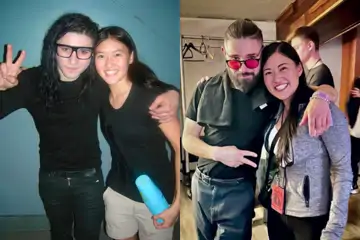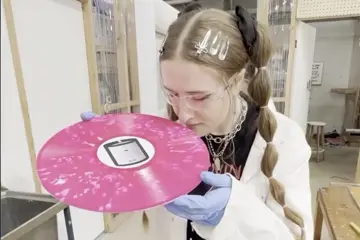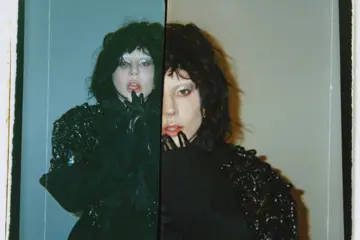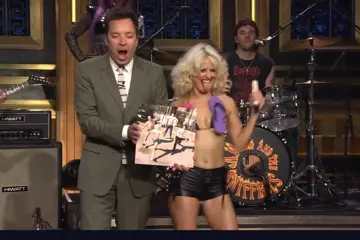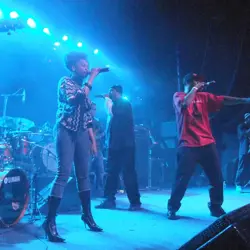 Digable Planets
Digable PlanetsThe New York jazz-rappers Digable Planets were among the most innovative players in '90s hip hop. Yet their legacy hasn't always been acknowledged. Now the poetic trio of Ishmael "Butterfly" Butler, Mariana "Ladybug Mecca" Vieira, and Craig "Doodlebug" Irving are again touring. And, no dusty 'retro' act, there is even the prospect of fresh music.
This month Digable Planets are finally performing in Australia, with a rhythm section. They'll headline Melbourne's inaugural FLOW Festival, as well as play Sydney and Perth. Butler, conducting interviews on a Sunday afternoon, has previously toured here, albeit with his later outfit, the avant-rap Shabazz Palaces, in 2012. The MC/producer is curious about the world and his place in it – which he attributes to parental influence (Butler's father was a history professor). "I learn something everywhere," Butler says. Travelling extensively, he tells of encountering "extreme poverty" and "opulence and wealth", humanity, architecture and natural landscapes. "I've had near-death experiences and I've had life-affirming experiences and romances." On this run, Butler will visit New Zealand for the first time. "Me and a couple of cats in the band, we're staying five extra days, too, so we're going to get a chance to see some shit and hang out a little bit."
Back In The Day
Invariably, Digable Planets are described as a Brooklyn, NY, group. But the transient three originated from hip hop's then periphery. Butler, who conceived the project, came from Seattle; Irving Philadelphia; and Vieira the Washington DC hub, in what is now hip hop's DMV (DC, Maryland, Virginia) nexus. Digable Planets settled in NY – and the city's vibrant early '90s hip hop culture seeped into their music, the ensemble emerging soon after the likewise Afrocentric, bohemian and abstract De La Soul and A Tribe Called Quest (ATCQ). In 1992 Digable Planets – rostered on Pendulum Records – aired the bouncy Rebirth Of Slick (Cool Like Dat), which would become their signature jam and win a rap Grammy. The MCs' debut album, Reachin' (A New Refutation Of Time And Space), with Butler co-producing, traversed jazz and hip hop – at its core samples, conscious themes, and entomological wordplay. Vieira represented women in hip hop's golden age, together with Queen Latifah. Digable Planets' tour DJ was Philly's King Britt.
Digable Planets followed with 1994's Blowout Comb, which, alas, suffered from poor promotion. The LP confused casual listeners into the posse's whimsicality, although it was praised by critics. Digable Planets utilised live, textural instrumentation while experimenting with minimalism and subliminality. However, lyrically, Blowout Comb was more direct, Digable Planets ruminating on life in their Brooklyn community and extolling black liberation (cue: the tautly funky single 9th Wonder (Blackitolism)). They had Guru guest. Digable Planets subsequently parted – apparently feeling conflicted on musical direction, disillusioned with industry machinations, and distracted by family matters.
With its 25th anniversary in October, Blowout Comb has been recognised as a slept-on classic – like De La Soul's cerebral Stakes Is High and ATCQ's muted The Love Movement. "It's kinda like looking at a photo album and seeing a period of your life," Butler ponders of Blowout Comb. "When I listen to it, I'm reminded of things. I don't really go back to it that much but, when I do, it brings me back to that period of my life – and our life – and what was happening then. So it's cool and fun to be able to play those songs again and go back in time and be put in those mental 'back-down-memory-lane' moments."
The MC is philosophical about the album's reception. "Back then, there was a lot less music coming out, and a lot more infrequently. So you were really tied to your last effort... If somebody liked you for some particular song or album, the next time you came out, it was an unspoken requirement that you stay within your wheelhouse or you risk losing the fans that you had gained. So I think that happened. It was just a different era in terms of music promotion. Radio play was very important in terms of giving exposure. We didn't have that Cool Like Dat hit song on the second album and it was a little more esoteric – so it was a departure. All the doors that had been opened up by the first album, ie radio and press; to come with a follow-up that was different from it, shut those doors down. It was just a tall task to try to repeat it. And, back then, it was: Make a hit record or a hit song. It was pretty difficult because the promotional environment was a lot different. So all of those things just were the storm that ended up making what happened happen then. But it wasn't a disappointment to me – I can't speak for anybody else. It just was what it was. We still did a lot of touring and had a lot of fun after that record."
The Age Of Shabazz Palaces
Post-split, Butler enjoyed the most high-profile career, even as he gravitated back to Seattle. In 2003, Butler introduced Cherrywine – a band as much as a solo vehicle with him picking up guitar (it included Digable Planets' current live musicians, and brothers, Thaddeus and Gerald Turner). Cherrywine's sole LP, Bright Black, is acid hip hop, electro-funk and psych-rock. "I haven't listened to it in a long time," Butler admits. "[But] that album's really special to me."
Assuming the handle 'Palaceer Lazaro', Butler then formed Shabazz Palaces with instrumentalist Tendai "Baba" Maraire – the initially mysterious combo heralding an epoch of auteur, futurist hip hop. Unusually, they signed to Seattle's Sub Pop – a label associated with grunge, not rap (in the late '90s, Sub Pop did have The Evil Tambourines, who developed a plunderphonics aesthetic). Shabazz Palaces' 2011 debut, Black Up, was universally acclaimed.
The Return Of Digable Planets
Digable Planets softly reunited in 2005, with a brief hiatus during the early 2010s (Vieira at one point temporarily dipped out). Two years ago they dropped a live album. Butler maintains that the group's dynamics haven't altered, but rather their personal situations. "So much time has went by and everybody's had kids and relationships that have come and gone." Such "responsibilities" brought maturity. "I think, essentially, the dynamic is pretty similar to what it was, but you just have to add in all of the things that occurred in life that sort of change your perception and the way that you move through the world. But, once you're in the groove and on stage and stuff like that, stuff is pretty similar to the way it was back then."
There has been speculation about new Digable Planets output. Is another project possible? "Yes, yes – we're thinking about it a lot," Butler replies. "We're even taking some steps towards actualising it; getting some music together and working on a few songs. Yeah, yeah, we think so."
Today Butler balances Digable Planets with Shabazz Palaces – plus Knife Knights, his noise/industrial/shoegaze venture alongside Erik Blood. In fact, Shabazz Palaces appeared on their old ally Flying Lotus' latest album, Flamagra (and Battles' Juice B Crypts). Butler tends to go with the flow. "It's more about what opportunities present themselves; like always working, always recording, always making music… And then, when the opportunities present themselves, just trying to capitalise on them, you know? It's more fortunate than anything… I have these different avenues of expression and it's a blessing to be able to use them and take those paths." He isn't worried about the dilemmas of compartmentalisation. "It is difficult, but it's the difficulty that I've chosen and that also provides the type of pressure situations that I like and that are inspirational and motivational."
Beyond Boom(er)-Bap
A sharp generational divide exists in urban music, with older fans dismissing especially contemporary hip hop as weird, nihilistic and insular. But the instinctive Butler has long transcended that headspace. He refuses to be defined or confined, yet doesn't chase trends or engineer artificial reinventions. It's no wonder that in 2013 Sub Pop offered him an A&R gig.
In general, Butler has a fluid view of culture – and pointedly doesn't focus on barriers so as to inadvertently validate them. "I think that, too, about that notion that music gets worse as you get older and the current music is bad and there's nothing in it and it lacks substance and it lacks value and the era that I came up in is the era where the music had the most integrity – I don't believe that's true. I believe that what you see in something is more about the limitations that are inside of you, rather than the limitations that the thing itself is presenting; so, if somebody doesn't see value in something, that it's a shortcoming in them, not necessarily the thing."
Butler accepts that, in a digital milieu, some inevitably latch on to music "to get famous or get rich." "I see that and it does make a lot of weak shit be able to come out more than ever before. But it also has freed up a lot of people that wouldn't have been able to ever be heard. It gives them the chance to be heard and get their music out there. It's a little more difficult to weed through things, but I've found it to be a much richer environment and [to] have a lot more diamond and jewellery to be found and discovered."
Regardless, Butler is inherently eclectic in his music tastes (in the '90s, he graced the UK drum 'n' bass duo 4hero's opus Two Pages on Talkin' Loud). "I like new stuff; I like the new ideas, I like the new rhythms, I like the new approaches. I do think it followed the materialism that spread around the world, that started in the United States, and it infiltrated the subject matter and the outlook on a lot of stuff. But music is a sign of the times and does reflect what's going on around you socially and politically. So I take things for what they are. You can't go back – and going back isn't progressive. I think progress is important for survival. I just don't really consider those provincial thoughts. I feel like it's a hindrance. It makes my life richer to have a very open mind; almost a childlike outlook on music and art. So I just keep moving forward. The new music is good, man – not all of it, but not all the old music is good, either!"
Lil Tracy And The New Wave
Butler is closely connected to hip hop's new wave. In 1995 he had a son, Jazz Butler, with Cheryl "Coko" Gamble, lead singer of the New Jill Swing group SWV (coincidentally featured on Chance The Rapper's The Big Day). And Lil Tracy, as he's now known to hip hoppers, surfaced as a cohort of GothBoiClique with Lil Peep, pioneering emo-rap. (Tracy also released the country-trap Like A Farmer prior to Lil Nas X's ascent.) Tracy's parents separating, he moved between their respective homes in Virginia Beach and Seattle. Butler recalls how, as a middle schooler, Tracy "couldn't wait" for him to go on tour so he might use his studio, messing around with guitar and Ableton. "I almost couldn't believe he had that level of dedication and concentration to stay with the things like that."
Indeed, Butler is proud – and inspired by – his independent offspring. "His musical taste is very, very broad," he stresses. "He's very young and curious and adventurous. He's an outgoing guy, too, so he's always meeting people and he's friendly. His curiosity and his ambition gets him to work in a lot of different areas. But, at the end of the day, he does have a very maverick spirit of his own and he's individual. So I expect he's going to probably do a wide swathe of different kinds of stuff over the course of his musical career." And, Butler affirms, the pair discuss music. "Yeah, all we do is talk about music and sports!"





